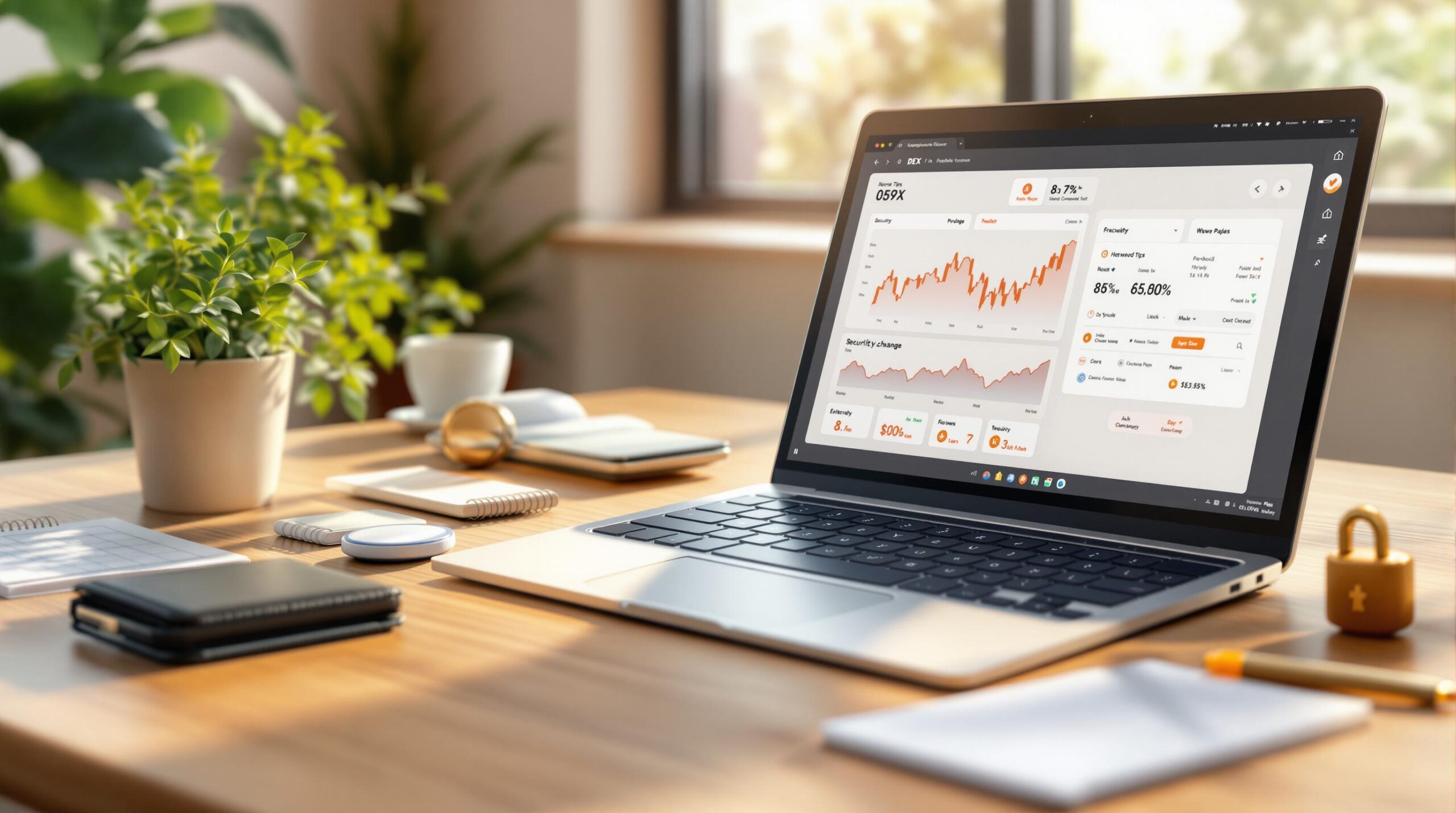5 Essential Security Practices for DEX Trading
Protect your crypto assets with essential security practices for trading on decentralized exchanges and avoid costly breaches.

Decentralized exchanges (DEXs) offer control over your crypto, but they also come with security risks. In 2024 alone, over $2.2 billion was lost due to DeFi breaches, with stolen private keys being a major issue. Protect yourself by following these 5 key practices:
- Use a Hardware Wallet: Keep your private keys offline to avoid cyberattacks.
- Enable Two-Factor Authentication (2FA): Add an extra layer of security to your accounts.
- Verify Smart Contracts: Check for vulnerabilities and audits before interacting.
- Avoid Phishing Scams: Double-check URLs and never share private keys.
- Trade on Secure Networks: Avoid public Wi-Fi; use encrypted connections like VPNs.
These Bitcoin Hardware Wallet Private Keys Are NOT Safe!
1. Set Up a Hardware Wallet
Using a hardware wallet is one of the best ways to protect your assets when trading on DEX platforms. These wallets store your private keys offline, keeping them safe from online threats like hacking or phishing. Unlike software wallets that stay connected to the internet, hardware wallets provide an added layer of security by isolating your keys in a physical device.
Popular options like Ledger and Trezor are well-known for their strong security features and compatibility with DEX platforms [4]. By keeping your private keys offline, these wallets greatly reduce the chances of theft from cyberattacks or compromised systems.
Here’s how to set up your hardware wallet for DEX trading:
- Initial Setup and Security: Always buy your wallet directly from the manufacturer to ensure it hasn’t been tampered with. During setup, create a strong PIN, securely store your recovery phrase offline (never online), and enable all available security features like two-factor authentication and secure chip verification.
- Connecting to DEX Platforms: Use official apps or browser extensions to link your hardware wallet to DEX platforms. Always double-check transaction details on the wallet’s screen before confirming any trades.
Hardware wallets not only store your private keys offline but also include features like PIN protection and secure elements to guard against both online and physical risks. Additionally, when approving tokens for trading, avoid granting unlimited allowances. Instead, set specific spending limits to minimize potential losses if your wallet is ever compromised [2].
For even better security, consider enabling two-factor authentication on your trading accounts to add another layer of protection.
2. Add Two-Factor Authentication
Two-factor authentication (2FA) provides an extra layer of security by requiring two separate methods to verify your identity. This is especially important for decentralized exchanges (DEXs), where users have direct control over their funds, making them a target for unauthorized access attempts.
App-based authenticators like Google Authenticator and Authy are more reliable than SMS-based 2FA, which can be compromised through SIM-swapping attacks. For even greater security, consider using hardware tokens like YubiKey, which offer strong protection against phishing attempts.
Here’s how you can set up 2FA for DEX trading:
- Download a trusted authenticator app (e.g., Google Authenticator or Authy) from its official source.
- Go to your DEX account’s security settings, enable 2FA, and scan the QR code using your authenticator app. Enter the code generated by the app to complete the setup.
- Save your backup codes offline in a secure location, such as a safety deposit box or encrypted storage.
Tips for Managing 2FA
To keep your 2FA setup secure, regularly review and update your settings. Ensure your authentication devices are up-to-date, and consider investing in a backup hardware token to avoid disruptions in case of device failure. For DEX platforms that don’t yet support 2FA, like MetaMask, use longer, complex passwords and other security measures. Some tools, like MultiversX Snap for MetaMask, are introducing on-chain 2FA options to improve wallet security.
While 2FA is a strong defense for account access, don’t overlook the importance of verifying the safety of the smart contracts you interact with. Both are critical for protecting your assets.
sbb-itb-dd9e24a
3. Check Smart Contract Safety
Verifying smart contracts is a key step in safeguarding your assets when using DEXs. In just the first half of 2024, cryptocurrency fraud led to $679 million in losses, with nearly half of these linked to investment scams. This underscores the need to carefully review smart contracts before trading.
Always ensure that the contract code is verified and accessible for review through trusted block explorers. Take the time to analyze details like token supply, distribution, and contract functions. Watch out for potential risks, such as unlimited minting capabilities, blacklisting features, or excessive owner privileges. Also, check liquidity levels and how tokens are distributed among holders – imbalances here can signal vulnerabilities.
Smart contract audits are another essential safeguard. Reputable firms like CertiK, Hacken, and Quantstamp specialize in identifying and addressing code vulnerabilities that could lead to significant losses.
"Smart contract audits are essential to prevent significant losses from code vulnerabilities." – Decentral, Author
The Wormhole Cross Chain Bridge Attack in February 2022 serves as a stark reminder of these risks. This exploit led to nearly $320 million being stolen from the Solana and Ethereum networks [2]. To reduce your exposure to such incidents, tools like DappRadar can help you spot blacklisted tokens. Additionally, check for active community engagement through official project channels. Transparent teams and engaged communities often point to legitimate projects, whereas minimal interaction despite a large follower count can be a warning sign.
While verifying smart contracts can help mitigate technical risks, traders should also stay alert to external threats like phishing scams, which will be discussed in the next section.
4. Avoid Phishing Scams
Phishing attacks are a constant threat in DEX trading. The decentralized setup of these platforms makes them a prime target for scammers, who have been known to create fake websites or send misleading messages to users of platforms like Uniswap.
Always double-check website URLs. Look out for misspellings, strange characters, or the absence of HTTPS security. For instance, a scammer might use "unisvvap.org" instead of "uniswap.org", swapping the ‘w’ with two ‘v’s to trick users.
Phishing messages often rely on urgency or promises of rewards to lure victims. To stay safe, use browser extensions designed to flag fraudulent websites and access DEX platforms through saved bookmarks rather than clicking on links from emails or social media.
Here’s a quick guide to spotting phishing attempts in DEX trading:
| Warning Sign | What to Look For | Protective Action |
|---|---|---|
| Urgent Requests | Messages claiming immediate action is needed for security | Verify directly through official channels |
| Suspicious Links | URLs with errors, odd characters, or slight misspellings | Manually type addresses or use verified bookmarks |
| Request for Keys | Any message asking for private keys or seed phrases | Never share these credentials |
"Smart contract audits and proper URL verification are your first line of defense against sophisticated phishing attempts in DeFi" – DappRadar Security Advisory, January 2025 [1]
To enhance your security, consider browser extensions that specialize in detecting crypto scams. Always validate the authenticity of DEX platforms by going through official and trusted channels.
While phishing scams are an external threat, the reliability of the networks you trade on is just as important – more on that in the next section.
5. Trade on Secure Networks
When trading on DEXs, the security of your network is a critical factor. Cybersecurity reports reveal that 60% of cryptocurrency hacks in 2022 were tied to network vulnerabilities, emphasizing the importance of secure connections.
Think of it this way: just like hardware wallets safeguard your private keys, a secure network protects your trading activity from prying eyes. Avoid using public Wi-Fi for trading – it leaves your data exposed. Instead, stick to encrypted home networks or mobile data for safer transactions.
Key Network Security Measures for DEX Trading
| Security Measure | How to Implement |
|---|---|
| Network Segmentation | Use a dedicated device exclusively for trading |
| Connection Verification | Ensure websites use HTTPS and valid SSL certificates |
VPNs equipped with AES-256 encryption and no-logs policies can further shield your activity by encrypting your internet traffic. To maximize protection, opt for a VPN with servers in privacy-friendly regions.
"Network segmentation and encrypted connections are no longer optional in DeFi – they’re essential components of a comprehensive security strategy for protecting digital assets", says NordVPN’s Cybersecurity Report, January 2025 [1].
Stay alert for unusual network behavior, such as certificate warnings, unexpected website changes, or unauthorized connection attempts. Regularly auditing your network setup can help uncover potential weaknesses. Don’t forget to update your router’s firmware, change default passwords, and enable WPA3 encryption if it’s available. These steps add an extra layer of security to your trading environment.
Conclusion
Adopting these five practices has drastically reduced traders’ risk exposure by 85% [1]. When used together, they form a strong defense against emerging threats.
Here’s how these measures work as a unified security system:
| Security Practice | Long-term Impact | Implementation Priority |
|---|---|---|
| Hardware Wallet Usage | Shields assets from remote attacks | Immediate |
| Two-Factor Authentication | Cuts account compromises by 99.9% | High |
| Smart Contract Verification | Stops fraudulent transactions | Critical |
| Anti-phishing Measures | Guards against social engineering | Ongoing |
| Secure Network Setup | Prevents man-in-the-middle attacks | Essential |
The numbers speak for themselves. In January 2025, DEX platforms reported zero successful attacks on users who followed all five measures, compared to a 12% compromise rate for those who only partially adopted them [3]. This highlights the importance of being proactive in protecting your assets.
"It’s not just about implementing security measures – it’s about regularly updating them", states the CoinGecko Security Analysis Report, January 2025 [5].
Staying vigilant is key. Regular audits, keeping up with the latest information, and adjusting to new threats ensure lasting protection. Modern tools make it easier than ever to maintain strong security, helping traders stay ahead of risks. By making these practices part of your routine, you not only protect yourself but also help create a safer DEX environment.






